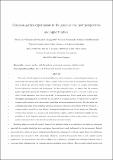Common garden experiments in the genomic era : new perspectives and opportunities
Abstract
The study of local adaptation is rendered difficult by many evolutionary confounding phenomena (e.g. genetic drift and demographic history). When complex traits are involved in local adaptation, phenomena such as phenotypic plasticity further hamper evolutionary biologists to study the complex relationships between phenotype, genotype and environment. In this perspective paper, we suggest that the common garden experiment, specifically designed to deal with phenotypic plasticity has a clear role to play in the study of local adaptation, even (if not specifically) in the genomic era. After a quick review of some high-throughput genotyping protocols relevant in the context of a common garden, we explore how to improve common garden analyses with dense marker panel data and recent statistical methods. We then show how combining approaches from population genomics and genome-wide association studies with the settings of a common garden can yield to a very efficient, thorough and integrative study of local adaptation. Especially, evidence from genomic (e.g. genome scan) and phenotypic origins constitute independent insights into the possibility of local adaptation scenarios, and genome-wide association studies in the context of a common garden experiment allow to decipher the genetic bases of adaptive traits.
Citation
de Villemereuil , P , Gaggiotti , O E , Mouterde , M & Till-Bottraud , I 2016 , ' Common garden experiments in the genomic era : new perspectives and opportunities ' , Heredity , vol. 116 , no. 3 , pp. 249-254 . https://doi.org/10.1038/hdy.2015.93
Publication
Heredity
Status
Peer reviewed
ISSN
0018-067XType
Journal item
Description
PdV was supported by a doctoral studentship from the French Ministère de la Recherche et de l’Enseignement Supérieur. OEG was supported by the Marine Alliance for Science and Technology for Scotland (MASTS)Collections
Items in the St Andrews Research Repository are protected by copyright, with all rights reserved, unless otherwise indicated.

